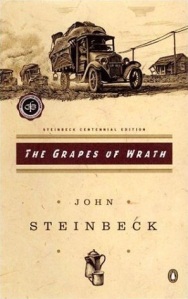 On my self-assigned course called “Books I Should Have Read Years Ago,” I recently finished Steinbeck’s The Grapes of Wrath. I’m not going to write about the characterizations or images or plot, because I think they’re all pretty straightforward and I think it’s easy enough that pretty much anyone could read it, so I think it’s justifiable how frequent it’s listed as required reading.
On my self-assigned course called “Books I Should Have Read Years Ago,” I recently finished Steinbeck’s The Grapes of Wrath. I’m not going to write about the characterizations or images or plot, because I think they’re all pretty straightforward and I think it’s easy enough that pretty much anyone could read it, so I think it’s justifiable how frequent it’s listed as required reading.
What interests me about The Grapes of Wrath is how hopeless the situation of the Joad family seems to them, and indeed how hopeless it becomes. I won’t spoil the ending image because it’s exceptionally powerful and I count myself fortunate that I managed to run in the circles I’ve run in without hearing the ending before I finished it myself. Suffice to say that the Joad family manages to steadily lose or have taken from them everything over the course of the novel, and find themselves destitute and helpless by the end.
The reason I find this interesting is that their helpless situation represents a low point in a string of highs and lows throughout history, and one that is more or less caused by the previous high. Farmers irresponsibly farmed wheat where it didn’t belong, resulting in loose soil that was picked up by the plains’ high winds and the Dust Bowl, which resulted in cataclysmic crop failure at the first major drought. Things were not helped by the Great Depression, and migrants from the Dust Bowl found little relief when the moved to California. Continue reading
